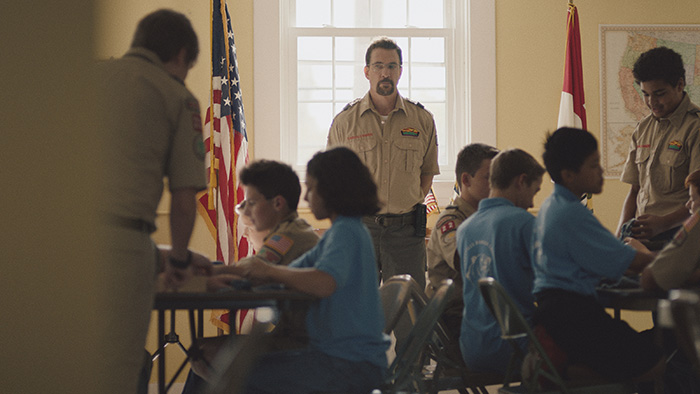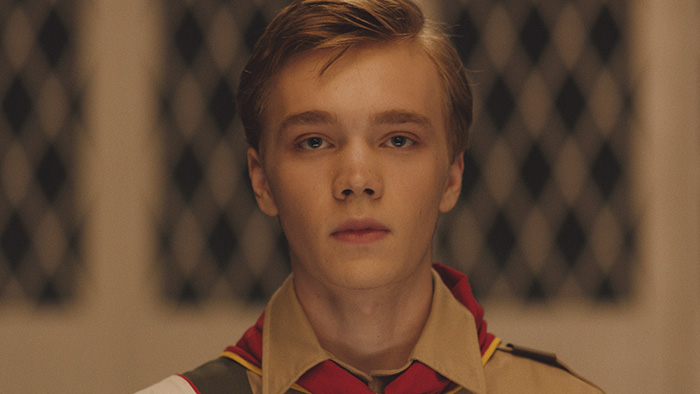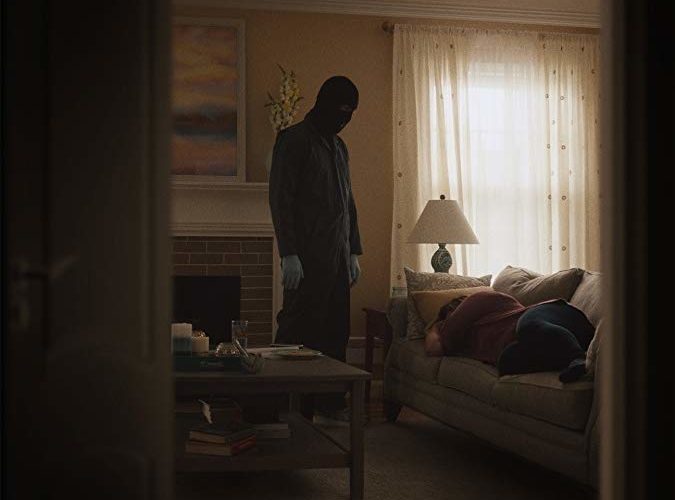Don Burnside (Dylan McDermott) is a pillar of his community. He’s the troop leader of his son’s (Charlie Plummer’s Tyler) church-adjacent Boy Scouts, a devout man of the Lord alongside his wife Cindy (Samantha Mathis), and the type of guy to go out of his way to volunteer and make the neighborhood a better place. So we laugh when the town’s resident eccentric teen (Madisen Beaty’s Kassi), carrying a mark of “whore” around simply because she’s an atheist among cultish worshippers needing a reason to denounce the “other,” asks Tyler if he thinks his father is the serial murderer known as The Clovehitch Killer. She laughs too. That guy? The doofy dad-of-the-year who cracks lame jokes and can barely keep a straight face when reprimanding misbehaving children? No.
Well, the joke might be on us because Tyler unwittingly finds himself stumbling upon evidence that would be tough to refute once a potential girlfriend brings up a folded and worn image of a woman in bondage from behind the seat of Don’s truck. She of course thinks it’s his and ignites a storm of conjecture wherein Tyler becomes the resident pervert. Since he knows this isn’t the case, however, the urge to discover whether or not his father is a pervert drives him to sneak around the backyard shed and uncover more unsavory keepsakes. Now a pariah looked upon with almost as much disdain as Kassi, he seeks her out as a friend and confidant thanks to her expertise in the Clovehitch case. Soon her laughter stops.
Director Duncan Skiles and screenwriter Christopher Ford ask us to get wrapped up in the mystery of who Clovehitch is by also asking us to accept way more than this minimalistic premise earns. We’re barely twenty minutes into the film when things are whittled down to three options. One: Don is the killer. Two: it’s Tyler’s Uncle Rudy who is now conveniently non-responsive and in a wheelchair. And Three: some random character will confess at the last minute to show how we’re all the real monsters for allowing ourselves to believe the worst about loved ones despite contradictory truths that should absolve them sight unseen. There’s definitely enough to those options to sustain two hours when someone as genial as Don will always come across as inherently creepy.

Unfortunately Skiles and Ford aren’t interested in that central mystery. On the contrary, they present its solution on an irrefutable platter around halfway through. We spend all this time invested in identifying a murderer only to have him rendered unimportant. The cute Encyclopedia Browning by Kassi to ask Don leading questions while Tyler uncomfortably changes the subject is pushed aside in order for us to watch the true Clovehitch in action. Why? Because the film wants us to enter his mind. It wants us to witness the war waging within it between compulsion and faith. It wants us to know that God is the reason no more victims have been found in the past decade. God has kept this maniac chained inside the body of an upstanding citizen.
Should we forgive him? Are we supposed to say, “He’s reformed” and let any backslide into carnage become an acceptable setback that needs rectification before ultimately being forgotten? I really hope not, but it’s tough to definitively say the filmmakers aren’t. They have a built-in bullshit detector with Kassi—the sole character onscreen not blindly following the scripture of a “cool” yet corny pastor (Jonathan K. Riggs)—and yet they don’t use her in that mode. Not only should her cynicism make her skeptical of appearances, a secret connection to Clovehitch should have her enraged if ever to come face-to-face with the man. But she’s not. She doesn’t even dial 9-1-1 when numerous opportunities arise. Eventually my disbelief in hers and Tylers’ actions became too large to suspend.
I get that Skiles and Ford might be trying to expose society’s sinister underbelly that, for example, allows pedophiles to act as priests right under its nose. What occurs in this movie isn’t a means to expose those “accomplices in silence” as wrong, though. No, The Clovehitch Killer seems to be condoning them. It’s willing to ensure the victims’ families never know the truth as long as those “innocents” who are close to the perpetrator are protected from having their lives ruined. The dead are made less valuable than the living because of a shoddy thought process along the lines of, “They’re already dead, so why destroy someone else’s life for nothing?” Nothing? Oh boy, did the end of this film make me mad.

Maybe that was the point? Maybe Skiles and Ford want me to be angry because I shouldn’t believe what happens? It’s possible, but I don’t buy it. They present Tyler in a way that supports his decision, but not Kassi. He’s brainwashed and thus believably one of those who legitimately think, “Why arrest Father So-and-So for what he did to those twenty kids when he’s saved thousands through his teachings about God?” Kassi on the other hand is specifically conditioned to reject that thought process. She’s the badass with a clear mind that doesn’t take guff from anyone and yet somehow she intentionally ignores that identity and the impulses it should supply because she feels sorry for the collateral damage? She is collateral damage. It’s absolutely confounding.
It’s a shame because McDermott effectively toes the line between dorky and menacing (before the film explains which is real), Plummer is great playing with a loaded deck of anxieties and insecurities, and Beaty performs her role perfectly until the writing abandons what made her necessary. There’s even an interesting focal shift with a rewound replay from a different perspective that would overcome its contrivance if things didn’t go off the rails as far as a final message proving more “There’s a Clovehitch in all of us” than “MURDER IS BAD.” I can’t accept that this is a maneuver to expose how everyone must look within and see the dark secrets we hide from the world. Sorry, but any compulsions I might have aren’t equivalent to cold-blooded homicide.
The Clovehitch Killer opens in limited release on Friday, November 16.

